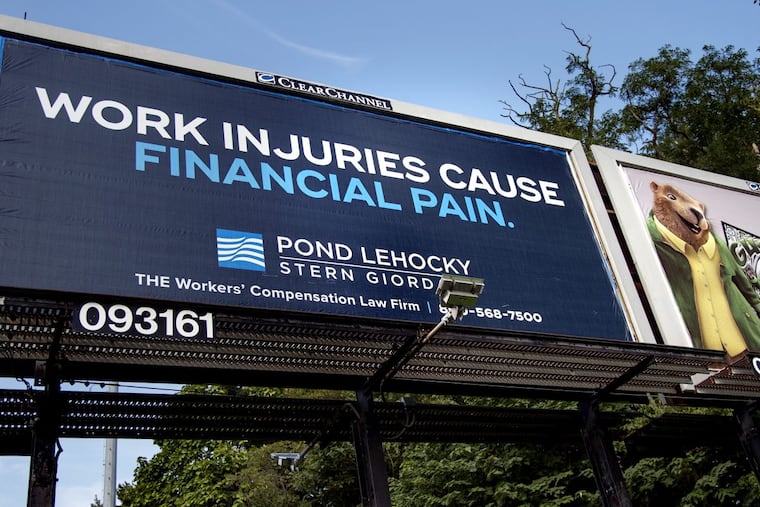GOP senators aim to limit drugs permitted under Pa. workers' comp
The state Senate plans to take up legislation to reform the state's workers' compensation system after an Inquirer and Daily News investigation into pharmacies owned by doctors and lawyers.

Lawmakers in Harrisburg say they will take up a bill to reform the state's workers' compensation system after an Inquirer and Daily News investigation into the prescribing patterns of Philadelphia-area pharmacies owned by doctors and lawyers who treat and represent injured workers.
Early backers of the changes include Senate President Pro Tempore Joseph Scarnati, Banking and Insurance Committee Chairman Donald White, and Sen. Mike Regan, who represents portions of York and Cumberland Counties.
The three Republicans circulated a memo Wednesday seeking cosponsors for the bill to create a list of drugs permitted to be prescribed under the state's workers' compensation program, similar to those used by standard health insurance plans, Medicare, and Medicaid.
They say that such an evidence-based drug formulary would curtail the overprescription of opioids and eliminate payments for unproven, compounded pain creams that can cost thousands of dollars per tube.
Last month, the Inquirer and Daily News reported that partners at Pond Lehocky Stern Giordano — which describes itself as the largest workers' comp law firm in Pennsylvania — are the majority owners of a mail-order pharmacy in Haverford called Workers First.
The firm has been sending its workers' comp clients to specific doctors, then asking the doctors to direct those clients to Workers First to have prescriptions filled. Workers First has charged upward of $4,000 per tube of compounded pain cream. In the workers' comp system in Pennsylvania, medical bills for injured workers are typically covered by employers or employers' workers' comp insurance providers.
In their legislative memo, the Republican senators seeking support for the drug formulary described that practice of law firms asking doctors to send patients to pharmacies they own as "ethically questionable." The senators say they want to contain costs and "ensure injured workers are prescribed the right medications and out of medical necessity, not merely as a profit motive."
Pond Lehocky has defended the pharmacy as legal and permitted under the state's rules of professional conduct for attorneys.
"Senators Scarnati, Regan, and I chose to introduce this legislation to help curb the opioid abuses and profit incentives that currently exist in Pennsylvania's workers' compensation system," White said in a statement Thursday. "Pennsylvania consistently ranks among the top states in opioid prescriptions for injured workers."
The language of the Senate bill has not been finalized, but it is expected to be introduced next week and mirror House Bill 18, a similar proposal that has failed to gain traction in the House. Like House Bill 18, the new legislation would likely cover all prescription medications in the workers' comp system — not just opioids and creams.
Attorney Sam Pond, who owns 20 percent of Workers First pharmacy, has headed the opposition to the House bill, claiming that a preapproved formulary would enable the insurance industry to boost its profits by denying needed medication to injured workers.
"You have to walk a day in my clients' shoes — assuming my clients can walk," Pond said in an interview last month.
Gov. Wolf has also opposed the House bill.
In July, Wolf attended a dinner at Del Frisco's steak house in Center City sponsored by Insight Medical Partners, a Conshohocken firm that manages and owns a portion of Workers First. An invitation to the event described it as an "exclusive dinner discussion" with Wolf. The RSVP was to Rishin Patel, CEO of Insight Medical Partners.
Patel and doctors and pharmacies affiliated with Insight Medical Partners are being sued by Liberty Mutual Insurance and other insurance firms for allegedly prescribing $3.7 million in allegedly fraudulent pain creams. The suit says the creams, which are not approved by the Food and Drug Administration, cost between $5,000 and $8,000 a tube.
Why are some pain creams so expensive?
This Pennsylvania Department of Labor & Industry PowerPoint slide describes a hypothetical price escalation of a compounded medication. In the workers’ compensation system, payments are typically capped at 110 percent of the Average Wholesale Price (AWP).

Jeff Sheridan, Wolf's campaign chairman, declined to comment on what was discussed at the dinner. He said it was not a fund-raiser.
Pond Lehocky has also circulated an invitation for a Nov. 1 fund-raiser for Wolf in the law firm's offices on Market Street. The suggested contribution is between $500 and $5,000.
Sheridan said in an email that the "location of the November 1st event has been changed" but declined to say more.
Wolf opposed the drug formulary proposed by the House because he believes it "would make it harder for individuals to receive the treatment they need or have access to the prescriptions they need," and because he doesn't think it tackles the problem of opioid overprescription, Sheridan said.
Pond Lehocky said in a statement Friday that it "proudly supports Governor Wolf. He has demonstrated common goals with us on all middle class Pennsylvanians' issues, including protecting the right to organize, raising the minimum wage, and standing up for workplace safety. As a firm dedicated to fighting for injured workers' rights, our support for him is rock solid."